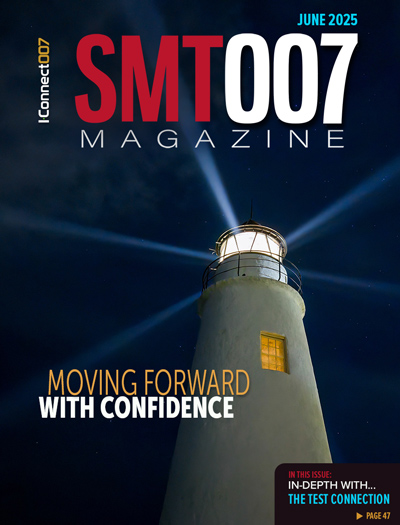-

- News
- Books
Featured Books
- smt007 Magazine
Latest Issues
Current Issue
Supply Chain Strategies
A successful brand is built on strong customer relationships—anchored by a well-orchestrated supply chain at its core. This month, we look at how managing your supply chain directly influences customer perception.

What's Your Sweet Spot?
Are you in a niche that’s growing or shrinking? Is it time to reassess and refocus? We spotlight companies thriving by redefining or reinforcing their niche. What are their insights?

Moving Forward With Confidence
In this issue, we focus on sales and quoting, workforce training, new IPC leadership in the U.S. and Canada, the effects of tariffs, CFX standards, and much more—all designed to provide perspective as you move through the cloud bank of today's shifting economic market.
- Articles
- Columns
- Links
- Media kit
||| MENU - smt007 Magazine
Japanese Joint Research Group win Prime Minister’s Award with Ultra High-performance Computing Platform
March 25, 2024 | FujitsuEstimated reading time: 2 minutes
A Japanese consortium of research partners including RIKEN, the National Institute of Advanced Industrial Science and Technology (AIST), the National Institute of Information and Communications Technology (NICT), Osaka University, Fujitsu Limited, and Nippon Telegraph and Telephone Corporation (NTT) have been recognized with the prestigious Prime Minister’s Award as part of the 53rd Japan Industrial Technology Awards for the successful development of a high-performance computing platform that leverages Japan's second domestically-made superconducting quantum computer.
The platform leverages Japan's second domestically-made 64-qubit superconducting quantum computer, which has been offered on the cloud since October 2023 to promote its use for commercial industrial research and development, and jointly developed by Fujitsu and RIKEN based on the know-how for the development of the first domestically-made 64-qubit superconducting quantum computer released in March 2023 by the joint research group.
The research group offered Japan's first superconducting quantum computer under a joint research agreement for non-commercial use for the purpose of promoting and developing research and development in quantum computation and other fields. RIKEN and Fujitsu also unveiled Japan's second superconducting quantum computer, based on the technology of the first superconducting quantum computer, on the cloud for industrial research and development in 2021, two and a half years after they established the RIKEN RQC-Fujitsu Collaboration Center.
These milestones highlight the rapid progress and innovative potential of Japan’s original quantum technologies, which are now demonstrating the ability to withstand the demands of the first stages of industrial application. One particularly promising technology is the superconducting quantum bit chip design proposed by RIKEN, which uses a unique three-dimensional mounting layout with scalability that can support expansion to the 1,000-qubit level.
RIKEN and Fujitsu’s superconducting quantum computer is provided as part of a hybrid quantum computing platform that also supports Fujitsu's 40-qubit quantum simulator, which remains one of the largest scale simulators in the world (1). This platform implements a scalable cloud architecture that allows seamless operation of both quantum computers and quantum simulators to promote and accelerate adoption and collaboration between various companies.
The platform was highly praised at the 53rd Japan Industrial Technology Awards for its technological capabilities (originality and advancement), and for marking an important step toward the industrial use of quantum computers based on Japan's unique quantum technology, and for its connection to efforts to expand the search for practical applications for quantum technology in various fields such as materials, finance, and drug discovery by providing a combination of quantum computing and quantum simulators to companies to engage in joint research projects.
In the future, the platform is anticipated to stimulate further research and development of quantum applications and accelerate the practical application of quantum computing technologies for both hardware and software, offering access to companies engaged in research in various fields.
The joint research group will continue to promote the social implementation of quantum computing by leveraging the strengths of each organization.
Testimonial
"The I-Connect007 team is outstanding—kind, responsive, and a true marketing partner. Their design team created fresh, eye-catching ads, and their editorial support polished our content to let our brand shine. Thank you all! "
Sweeney Ng - CEE PCBSuggested Items
Iceberg Quantum Boosts Diraq’s Error-Correction Expertise
08/12/2025 | DiraqDiraq has partnered with new venture Iceberg Quantum to extract early value from its quantum computers. Diraq has a clear line of sight towards delivering quantum computers that are utility scale, the point at which commercial value exceeds operational cost.
Boeing-Built X-37B Spaceplane Set for Eighth Mission
08/04/2025 | BoeingThe Boeing-built X-37B Orbital Test Vehicle (OTV) is preparing to launch its eighth mission (OTV-8) from Florida's Space Coast, with liftoff scheduled no earlier than August 21. This milestone comes less than six months after the successful completion of OTV-7.
Keysight Installs World’s Largest Commercial Quantum Control System at AIST’s Leading-Edge G-QuAT Center
07/30/2025 | Keysight TechnologiesKeysight Technologies, Inc. has delivered the world’s largest1 commercial quantum control system (QCS) to the National Institute of Advanced Industrial Science and Technology (AIST) in Japan.
Diraq Secures CTCP Funding to Uncover Energy Applications
07/28/2025 | DiraqDiraq has been awarded AU$500,000 in funding to explore how quantum computers can enhance the performance, sustainability and security of energy networks.
Honeywell Awarded U.S. Government Contracts to Develop Quantum Sensor-Based Navigation Systems
07/21/2025 | HoneywellHoneywell has been selected by the U.S. Department of Defense’s (DOD) Defense Innovation Unit (DIU) to participate in the Transition of Quantum Sensing (TQS) program.


